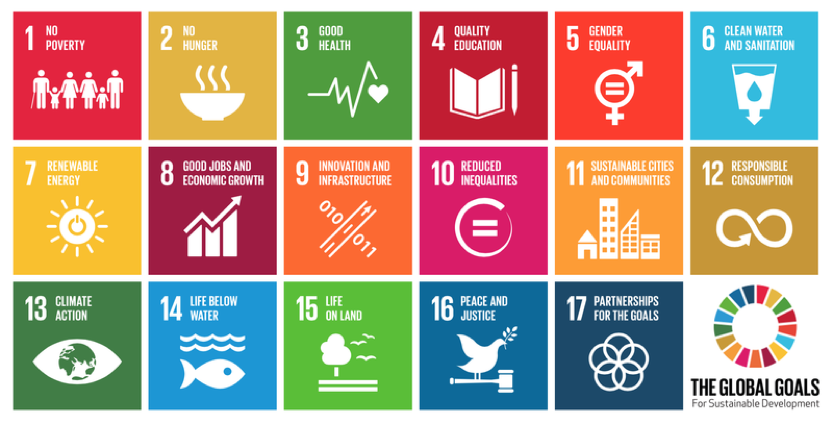Big Business By Giving Back
27 April 2016Last year, Cardiff Business School launched its Public Value Business Strategy. It aims to be the first business school in the world to seek to deliver as much ‘social value’ as it does ‘economic’. This is a significant shift in focus for a business school to take; to seek responsibility to not only deliver prosperity for organisations, but also to ensure that its students and the organisations that the school interacts with are cognizant of the grand challenges of our time and aim to do something about them. This means it will work to deliver research that directly addresses major global problems such as climate change and gender inequality. The United Nations has developed a number of sustainability goals, which are a brilliant summation of the challenges the world faces and what we need to do in order to work towards the lessening of inequality.

A somewhat daunting list, but business should not fear getting involved in the sustainability agenda. Professor Ken Peattie of the Cardiff Business School, in a CIPD report about responsible and sustainable business, discusses research by Harvard Business School and London Business School – The Impact of a Corporate Culture of Sustainability on Corporate Behavior and Performance – that proves “a £1 investment in a value-weighted portfolio of high sustainability firms in 1993 would have increased to £22.60 by the end of 2010, compared with a return of £15.40 from the low sustainability performers”. Indeed, in a 2010 Accenture and UN Global Compact survey of global leaders, 93% of CEOs see issues relating to sustainability as “critical to the future success of their business”.
Innocent Drinks is one company that places equal importance on both responsible business and delivering economic value. It recently spoke at an event at the school that looked at lean and green operations. Case studies included work that it had done in Spain’s Donana National Park to reduce the water demands of strawberry farming, and also how mango farmers in India had been helped to increase their yields by 25% in the face of climate change. Sustainability is part of its DNA, and the financial profits gleaned from its work in this area were not passed on to Innocent, but were kept with the farmers, which is an almost astonishing approach within supply chain management. To ‘profit share’ would contradict its core values.
This view has been similarly shared by the Welsh Government, which has taken an unprecedented step in terms of seeking to put core sustainability values at the heart of our public services. The Well Being of Future Generations Act came into force in April 2015 and seeks to ensure that organisations work across boundaries and make decisions based on their long-term impact, improving the social, economic, environmental and cultural well-being of Wales. Too often companies make decisions based on a short-term view, driven by budgets or political election. The Act is designed to ensure that decisions made will protect and benefit future generations.
To me, it is essential that businesses use all the technological advances at their disposal to protect future generations, to seek to tackle those global goals for sustainable development compiled by the UN. Research and experience has shown that their profits can grow as a consequence of pursuing such an agenda, and that delivering social value can be as important a driver to achieving economic value as the mere pursuit of economic value alone.
Comments
1 comment
Comments are closed.
- Recharging Batteries
- Marketing Magic
- What’s My Job Again?
- The Reports Have Gone to Her Head
- Cross Stitch Standards and Creativity
- Hefin David and the Aeroplane Arms
- Hankering for a Handbook
- Window of Light
- Defensive Organising
- McMullin’s Tandem of Co-Production
- The Joy of John Parry-Jones
- The Perils of Disappointment
- The Shield of Shame
- Customer Care and Organisation Innovation
- Hooray for Humanity!
- Angry Lemons
- Double Meanings
- Ticketing Masterplans
- When will it all end …
- Lifetime Loyalty and Taylor Swift
- Looking at Things Differently
- Networking Noodles
- Addicted to Truth
- Designs on Service Design
- The Multiple Joys of Universal Design
- Hungry Cultures
- Event Lean
- The Traffic Analogy
- Moving on Up
- Rosé Cava Revolution?
- Powerpoint Sneaky Lean
- Writing about Writing
- ChatGPT Response: Exploring the Art of Expression: Unveiling the Magic of Writing in the Style of Sarah Lethbridge
- Help to Grow Coldplay Style
- Caring IS Everything!
- Institutional Flapping
- “Just Do the Next Right Thing”
- Trust Thermoclines
- Organisational Tempo
- The Inaugural Lethbridge Customer Service Awards
- December 2025 (1)
- November 2025 (1)
- October 2025 (2)
- September 2025 (1)
- August 2025 (2)
- July 2025 (1)
- June 2025 (1)
- April 2025 (1)
- March 2025 (2)
- February 2025 (1)
- January 2025 (1)
- December 2024 (1)
- November 2024 (1)
- October 2024 (1)
- September 2024 (1)
- July 2024 (2)
- June 2024 (1)
- May 2024 (1)
- March 2024 (1)
- February 2024 (2)
- December 2023 (2)
- October 2023 (2)
- September 2023 (1)
- July 2023 (3)
- June 2023 (1)
- May 2023 (1)
- April 2023 (1)
- March 2023 (1)
- February 2023 (1)
- January 2023 (1)
- November 2022 (1)
- October 2022 (2)
- August 2022 (2)
- July 2022 (1)
- May 2022 (2)
- April 2022 (1)
- February 2022 (1)
- January 2022 (1)
- December 2021 (2)
- November 2021 (1)
- October 2021 (1)
- September 2021 (1)
- August 2021 (1)
- July 2021 (1)
- May 2021 (2)
- April 2021 (1)
- March 2021 (1)
- January 2021 (1)
- December 2020 (1)
- October 2020 (3)
- August 2020 (1)
- June 2020 (2)
- April 2020 (1)
- March 2020 (1)
- February 2020 (1)
- December 2019 (2)
- October 2019 (1)
- September 2019 (1)
- August 2019 (1)
- July 2019 (1)
- June 2019 (1)
- February 2019 (3)
- October 2018 (1)
- September 2018 (1)
- March 2018 (10)
- April 2016 (1)
- January 2015 (3)
- July 2014 (9)
- September 2013 (1)

Indeed Innocent Drinks is an excellent example in this area. It is also encouraging to see Cardiff Business School leading the way.